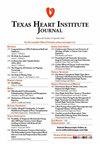心肌细胞的多倍性:用于单细胞分析的机器学习。
IF 0.9
4区 医学
引用次数: 0
摘要
本文章由计算机程序翻译,如有差异,请以英文原文为准。
Polyploidy in Cardiomyocytes: Machine Learning for Single Cell Analyses.
powers population-based studies of polyploidy, paving the way for advanced explorations of ploidy dynamics in myocardial biology. This methodology will be used to reevaluate ploidy response to myocardial injury, repair, and regeneration.
求助全文
通过发布文献求助,成功后即可免费获取论文全文。
去求助
来源期刊

Texas Heart Institute Journal
CARDIAC & CARDIOVASCULAR SYSTEMS-
自引率
11.10%
发文量
131
期刊介绍:
For more than 45 years, the Texas Heart Institute Journal has been published by the Texas Heart Institute as part of its medical education program. Our bimonthly peer-reviewed journal enjoys a global audience of physicians, scientists, and healthcare professionals who are contributing to the prevention, diagnosis, and treatment of cardiovascular disease.
The Journal was printed under the name of Cardiovascular Diseases from 1974 through 1981 (ISSN 0093-3546). The name was changed to Texas Heart Institute Journal in 1982 and was printed through 2013 (ISSN 0730-2347). In 2014, the Journal moved to online-only publication. It is indexed by Index Medicus/MEDLINE and by other indexing and abstracting services worldwide. Our full archive is available at PubMed Central.
The Journal invites authors to submit these article types for review:
-Clinical Investigations-
Laboratory Investigations-
Reviews-
Techniques-
Coronary Anomalies-
History of Medicine-
Case Reports/Case Series (Submission Fee: $70.00 USD)-
Images in Cardiovascular Medicine (Submission Fee: $35.00 USD)-
Guest Editorials-
Peabody’s Corner-
Letters to the Editor
 求助内容:
求助内容: 应助结果提醒方式:
应助结果提醒方式:


